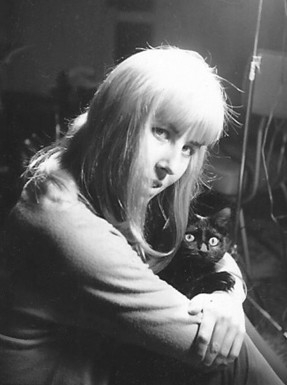Editor's Note: In each Wild Women with Steak Knives entry, author Alexandra Heller-Nicholas examines a woman-directed horror film that's been largely overlooked or forgotten. Read them all here!
It's perhaps not common, but sometimes a film packs such enormous punch in its final moments that it can make watching an otherwise relatively pedestrian film completely worth it. Exhibit A: Christina Hornisher's 1973 low-budget serial killer film Hollywood 90028, also later released as both Insanity and rather garish The Hollywood Hillside Strangler. But this is perhaps unfair to Hornisher - while clearly a super low-budget indie horror film that reveals more than a few rough edges in terms of production quality, there is, at times, an energy and originality in this film that more polished movies should envy. And that's not even taking its frankly jaw-dropping ending into account.
Unlike a lot of films I explore in this column, Hollywood 90028 has been blessed with much-deserved new life and has recently been treated to a breathtaking 4K restoration by Grindhouse Releasing and is even set to play Spain's Sitges Film Festival in October. Yet despite its recent rediscovery, the film is virtually unheard of when discussing the history of women horror movie directors. Until now, at least, Hornisher's name is rarely if ever, used in the same breath as better-known filmmakers like Stephanie Rothman.
To be fair, Hollywood 90028 might lack the formal tightness of movies like The Velvet Vampire, which came out just before Hornisher's movie. Hornisher certainly lacked the distributive clout Rothman had due to her relationship with New Line Pictures. But Hollywood 90028 has a kind of dazzling, raw energy that is jaw-dropping, and this recent attention will hopefully see it receive its rightful place in horror film history.
What little is known about Hornisher can be gleaned from an impressive deep dive into her career by Marc Edward Heuck on his blog, The Projector Has Been Drinking. Beginning with an exploration of the short films she made at film school and then addressing her career and life as a whole, it feels more respectful to point you in that direction because it is a truly remarkable read in its own right. The focus here is primarily on Hollywood 90028, and to its credit, there is more than enough in the movie itself to keep us busy.
The film stars Christopher Augustine as Mark, Hornisher's somewhat tragic serial killer protagonist. With his handlebar mustache and aviator sunglasses, you can buy old calendars from 1973 off eBay that are less dated than this guy. On the surface, he appears to be the very embodiment of seventies tough guy masculinity. And even before the opening credits, we discover that he has a distinctly nasty edge as he picks up a woman in a bar, returns to her home, and promptly kills her.

The opening credits present a series of still photographs that collectively provide us with the bare bones of Mark's backstory; as a child, he pushed a stroller with his baby brother into heavy traffic, killing him instantly. As an adult, Mark moves to California with dreams of becoming a cinematographer, but to pay the rent and gain experience in the industry, he finds himself working for a sleazy pornographer called Jobal, played by an actor with the remarkable name of Dick Glass (yes, really).
It is through his work in porn that Mark meets Michelle, who - like him - aspires to greater ambitions for herself than the life she currently has. As the relationship blossoms, Mark almost (but not quite) quells his murderous desires. When Michelle has second thoughts, it sparks a series of events that even the most hardened horror connoisseur would flag as unpredictable.

What this brief plot overview lacks, however, is describing just how much thought Hornisher has clearly put into the construction of Mark as a character, his job as a cameraman, and the potential violence of the male gaze. As Heuck rightly notes, this film owes a great deal in this sense to Michael Powell's Peeping Tom — another horror film about a cameraman for smut movies who moonlights as a deranged killer — so Hornisher isn't exactly reinventing the wheel here. But that her film predates Laura Mulvey's famous 1975 essay "Visual Pleasure and Narrative Cinema" by at least two years is in itself very impressive; if you are looking for a textbook case of Mulvey's description of a violent and sadistic male gaze, you can't go past Hollywood 90028.
All that aside — and what will keep you coming back to this film — is the sheer narrative and technological audacity of its final ninety seconds. Despite some of the movie being marked by rough filmmaking in places, it largely remains an audacious and stylistically bold portrait of masculinity in crisis. But even on top of some genuinely interesting filmmaking experiments, such as a striptease film Mark watches in a porn shop at one point, it all ultimately pales in comparison to this movie's ending. To give it away would spoil the fun, but once the end credits roll, it's easy to argue that this is a film deserving so much more attention than it currently receives — and hopefully, the new 4K release will see it gain its proper place in horror history.







